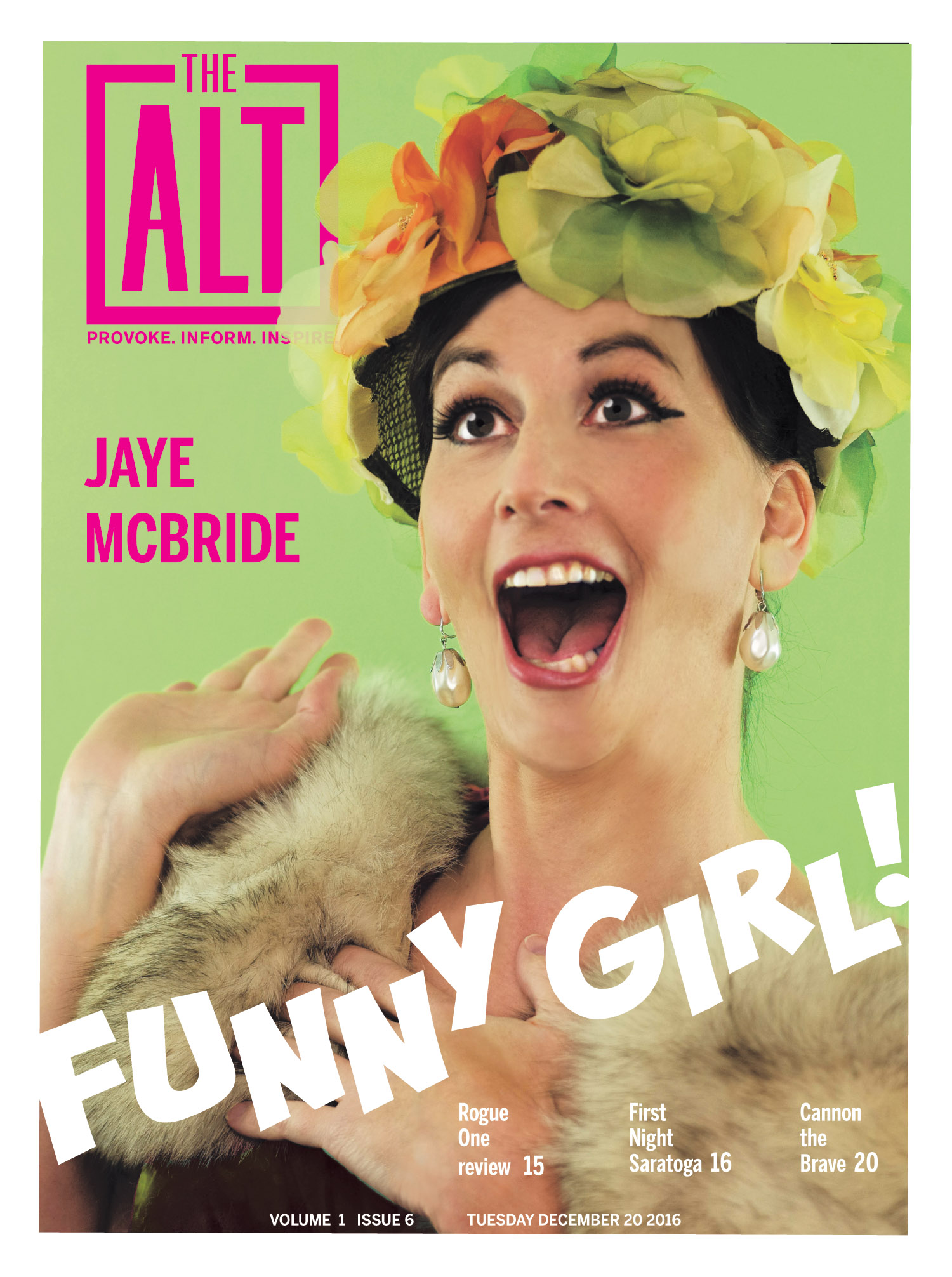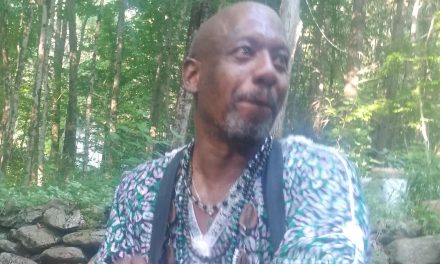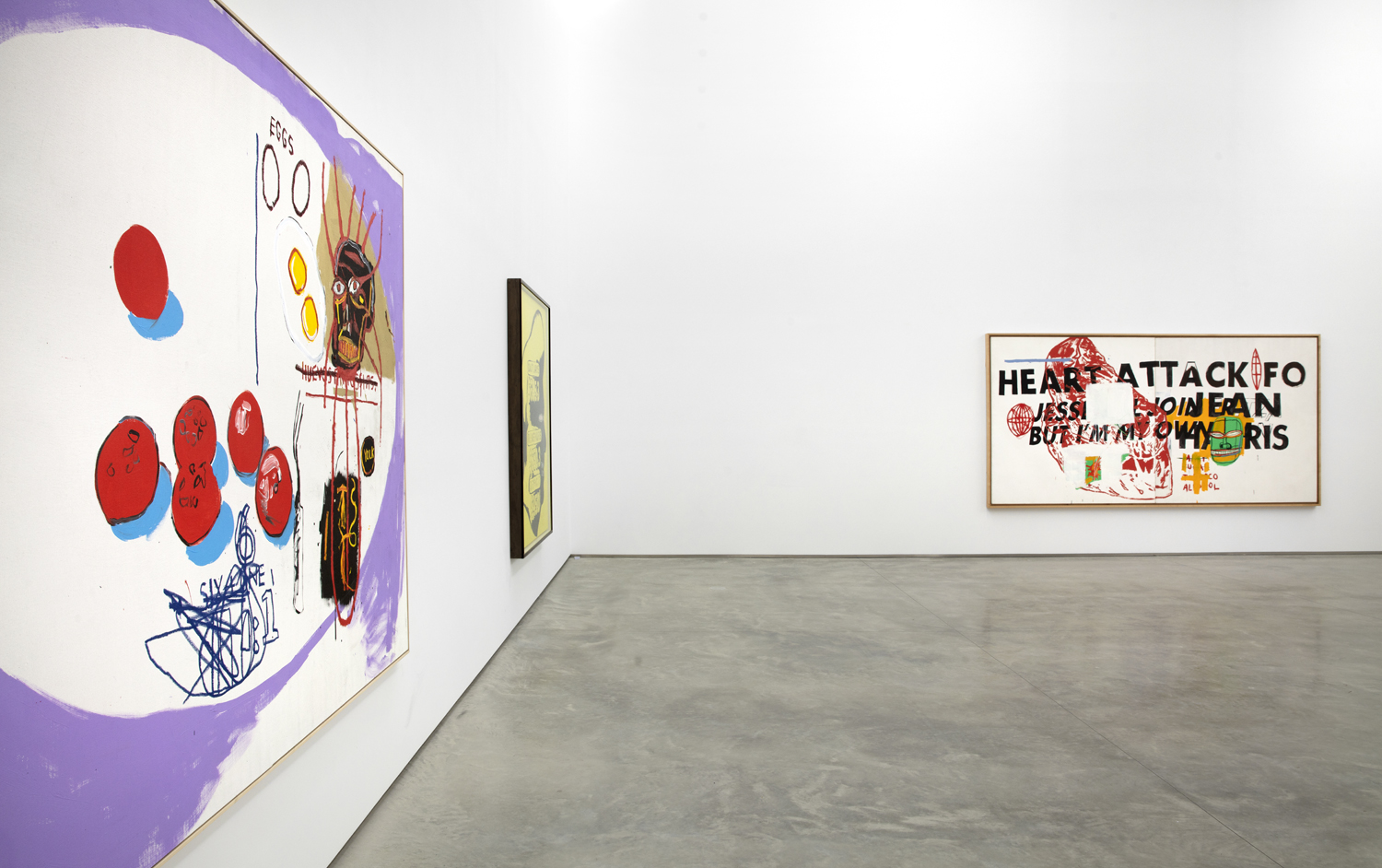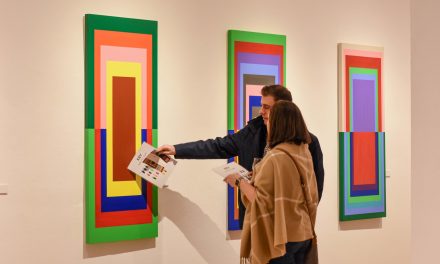Ask some artists and they’ll say that they were always certain. But Jaye McBride says she didn’t know what she wanted to be when she grew up. Sharing her story over coffee, she describes her childhood forays into comedy as fleeting happenstance.
She recalls clearly her first words spoken on stage. Recreating them now, she hunches her shoulders forward, widens her eyes and drops her jaw. She looks like a timid kid, rather than the comfortable woman of a just moment before. After a significant panicked beat, she repeats that long-ago opening line: “ . . . uuuhhh . . .”
The memory cracks her up. She laughs, easing back into a more natural posture. So, it is once again the striking brunette adult who says, “Oh, yeah, it was terrible.” Yet, though those horror-stricken moments in her 7th-grade talent show are typified as just a commonplace middle-school experience, she still remembers the material with precision.
“I’d make fun of the seniors. The class my older brother was in. You know, ‘What do you get when you cross a senior with a gorilla? A dumb gorilla.’ That kind of thing. They were just stock jokes.”
She is even more analytical about her earliest original work.
“There was this one joke, I think it was probably the first joke I ever wrote. I would say, ‘Boy, the people from Elizabethtown’–which was one of our school’s sports rivals–‘they’re getting really strong. They’re getting so good they’re bench pressing their woodstoves. Thing is, they can’t keep playing, because they’ve got third-degree burns on their hands.’”
McBride shakes her head at the memory, incredulous. “It was cute, I guess. But why would they bench press woodstoves? I don’t know. I didn’t ask those questions.” Those are the kinds of questions a comedian should ask, is the implication. It makes complete sense that the current Jaye McBride would look back upon the fledgling comic with this critical perspective; and it’d be easy to read this retrospective evaluation as strong suggestion that this was always to be her path, after all.
But is that how fate works? Is it as inexorable and obvious? Or is it the tentative, precarious product of choices made at every point along the way? The benefit of hindsight provides an easy through line from that early performance to the current working comedian. Sure, of course: Listen to McBride break those jokes down: Comedy’s what she does. But there’s another important current of McBride’s story that runs deeper than vocation. It’s a current that even in hindsight can be viewed as uncertain and, at times, dire. Because when performing that rough 7th-grade set, she not only had no plan to be the adult comedian Jaye McBride; she had no plan to be the adult woman Jaye McBride. The crowd in that auditorium–her classmates, her brothers, her parents–didn’t see a girl who would grow into that role, or that being. They saw instead a boy from school, they saw their brother, they saw their son.
* * *
McBride grew up as one of the four McBride boys, in Westport, New York, which is about two hours north of Albany. “Northway Exit 31,” she says, in a shorthand immediately recognizable to Upstaters as “way the fuck up there.” Her family was, she says, “pragmatic Irish Catholic.” That status, combined with the personality of the region and the comparative lack of cultural exposure, did little to promote thoughts of a career in comedy, and nothing at all to help her understand herself as transgendered.
She recalls the standard entertainments of the pre-Internet era: “There was Saturday Night Live, of course, and there was a bit of a boom of stand-up on cable. So, in addition to established people like Eddie Murphy, I’d catch newer comedians like Jake Johannsen. But I didn’t take them seriously as role models. I just liked to laugh. Everyone does.”
So, the McBride brothers kept each other sharp in traditional fashion, by amusing and ragging on one another. But there were no dreams of stardom. By high school, Jaye had stopped participating in the annual talent show (though she won first place one year): “Comedy pretty much faded from my awareness.”
And if Westport was resistant to something so exotic as the notion of being a professional comedian, it was absolutely impervious to her sense of a deeper personal difference, which remained unspoken.
In recent sets, McBride has performed this joke: “I remember when I was little, I said, ‘Dad, what do you call a little boy who wants to be a little girl?’ And he said, ‘I don’t know, but they’re definitely not getting any ice cream.’” Live, the bit gets laughs in great part due to her voicing of the dad. It’s not angry. It’s almost cheerful. It’s an identity-obliterating message delivered in a chipper Ward Cleaver voice.
In this scheme, otherness isn’t just bad, it’s impossible. Words don’t even exist for it. So, when McBride finished high school she left Westport not for the comedy clubs and alternative culture of New York City or L.A. but for the lecture halls of Potsdam (from Albany, that’s Northway Exit 23). She enrolled at Clarkson University to study engineering.
It wasn’t a good fit. She was certain of that by nuclear physics. She transferred to the University at Albany, registering for the only classes that held some hint of promise: “I went for a psychology degree because it was the only course that had even the mention of the word ‘transgender.’ ”
“I had a kind of voyeuristic relationship to myself at the time,” she explains. “I would read and think secretly, ‘Yes, that’s me!’ Then I’d be really macho so no one else could see it. Like, ‘Did you get a load of what was going on in psych class today? Kah-ray-zee!’”
Maintaining the posture was costly. She tried dating a woman, but that only increased the sense of wrongness. “It got to a point where I couldn’t take it anymore. I just broke down: ‘That’s it. I’m going to kill myself, just to get this over with.’ One night I was very, very drunk. I decided I would slit my wrists.”
It’s an ugly truth that this desperate situation is common for trans people. Despite some societal and legal gains in recent years, the trans and non-gender-normative communities still face dangerous obstacles: harassment, unemployment, substance abuse, and mental- and emotional-health difficulties are reported in far higher incidences than average. According to a report published by the Williams Institute, the rate of attempted suicide among the trans population is a staggering 41 percent, compared to 4.6 percent of the general population.
Fortunately, Jaye’s attempt was unsuccessful. Characteristically, she finds that fact funny. As she explains: “Well, what I did, was grab a serrated blade.” She lets the image settle. “I was at it for, like, half an hour.”
McBride came out of that dark moment with that punchline, but also a realization that she needed help in dealing with her issues. She sought out a support group and a therapist (through Choices Counseling in Albany). With that decision, things started to improve.
“Each step was still hard,” she says of her transition. “The first day you go out in public … I was sprinting to my car, so I didn’t get the shit kicked out of me. But, eventually, the more you do it, the more you realize that people don’t care. They’re in their own minds.”
That awareness bolstered her confidence, but she still dreaded the prospect of telling her own family. Though her father, he of the ice-cream gag, had passed away, the thought of being disowned still loomed large. Happily, two of her brothers were immediately and unhesitatingly on board. Her mother was slow to understand but made the attempt and ultimately “was just amazing.” (Her eldest brother has not been as accepting, and McBride says that they have not had “meaningful communication” in the 10 years since she came out.)
When discussing her trying–even outright grim–experiences McBride is funny. Jokes were a source of comfort, strength and protection in her most difficult hours, but that sense of humor is a consistent thread throughout her conversation, whatever the topic. It’s her personal vernacular and, again, it’d be easy to see that as constant foreshadowing. Her formal return to the comedy stage, she says, though, was fortuitous. A random conversation at the 2009 Larkfest informed her of the Lark Tavern’s weekly open mic. She hadn’t performed since her talent show days, but she gave it another shot. After a five-minute set, she was hooked.
Interestingly, that early material did not deal with her transition. After the long years of prohibited expression, why leave that out of her comedy?
“Looking back, I’d say it was that I was afraid to,” she says now. “I tried to rationalize it as, ‘I don’t want to be one of those comics who just talk about that one thing–the gay comic who talks about being gay, the Latin comic who talks about being Latin. I don’t want to be pigeonholed.’ Really, I was afraid of rejection.”
It was a question from another comedian that reminded her what she was giving up. “There was a comic I’d see around at open mics and one night he asked a friend of mine if I was closeted. She said, ‘I don’t know. You’d have to ask her.’ I thought, I don’t want that. I don’t want people to think I’m ashamed of who I am.”
A local contest for the Boston Comedy Festival gave her the opportunity to step up. “That was where I unleashed ’em,” she says, referring to the trans-related jokes. “And it was great, the support I got personally. But it was also a powerful moment. I realized that there are people who could use my help. By hiding I’m doing a disservice to trans people, when I could help.”
“Granted it’s by telling dick jokes,” she adds.
So, McBride’s been busy. She’s been consistently booking paying gigs, and recently has been able to commit to comedy full-time. Last year, she delivered an advocacy-oriented Ted Talk focused on trans issues. She hopes to bring this presentation, in some form, on the road and, late this November, she traveled to Los Angeles to audition for an organization that books colleges in the area. If things go well, she will have the opportunity to perform shows combining both her stand-up and this, still funny, informative material for young audiences up and down the coast. (While out west, she also had the chance to perform at the Hollywood Improv in a weekly showcase hosted by Bobcat Goldthwait, who is both a friend and a fan of hers.) Ultimately, she’d like to be the go-to person for media dealing with her community. “When Bill Maher needs somebody, when Fox’s Red Eye needs somebody on trans issues, I want to be first on the list.”
The very necessity of a presentation like the one McBride is pitching makes clear that things are far from perfect. On her recent trip to California, a fellow comedian was moved up in the night’s lineup by a host who wanted him to deliver a mean-spirited “tranny” joke right after she performed; at a club in upstate New York, a booker asked her to nix the trans material, and then began hitting on her. “Apparently it was just the onstage material that bothered him; other than that he was very intrigued.”
Generally, though, she finds audiences accepting and (appropriately) warm. “ It’s impossible to hate someone whose story you know, ” she says. “When you realize what someone has been through in their life, you look at them differently. They see I’m trans, but I’m also a person. I’m not just this caricature of a person, jumping in the wrong restroom. They see me as a person first.”
A person first. A funny person, by both habit and training. A trans person, who had to learn that for herself along the way. A person who’s faced challenges and made difficult choices, and hopes to make things better for those who might face similar circumstances.
“I’m not egotistical enough to think that I’m so funny that I can win everybody over,” she says, admitting the scope of the challenge. She lets the set up hang for a moment. “But I am pretty funny.”






Appreciate tgis post. Let me try it out.
I happen to be checking out for a little bit for any
good quality articles or blogs on this type of area .
Exploring in Yahoo I at last stumbled upon this site.
Reading this information made me pleased that I’ve discovered
precisely what I needed.
http://poradnikfaceta.com/dlaczego-moja-zona-chce-rozwodu/ One such website has exploded beyond all expectations inside above requirements, and that website is .
Maybe Brave will probably turn into a brand new legend
of Pixar animated movie. Without a doubt, your family and friends need out for the perfect interest of one’s child.